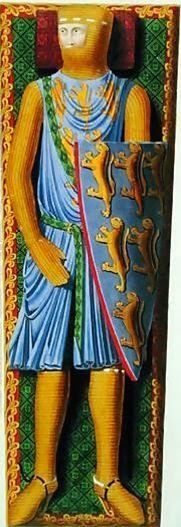 |
| 19th c. painting of William [link] |
In 1188, still a teenager, King Henry II gave him the Appleby estate in Lincolnshire. In 1196, the second Earl of Salisbury having just died, King Richard married William off to the Earl's nine-year-old daughter, Ela. This made William the 3rd Earl of Salisbury jure uxoris ["by right of marriage"]. Although it was merely a political match that rewarded William (and put Salisbury into safe hands), William and Ela had several children; the eldest, William II, was born c. 1212.
During John's reign, William was given responsibility for several other positions: warden of the Welsh Marches (this was before Wales was divided into English counties); sheriff of (at different times) Wiltshire, Cambridgeshire, Huntingdonshire; and the very powerful (but now just ceremonial) Lord Warden of the Cinque Ports, with authority over collecting taxes and dealing with crimes at the five important ports on the southern coast.
Besides commanding the expeditions to Wales and Ireland, William led the fleet that did so much damage to the French and brought back so much wealth for the Battle of Damme. He went up against the French again when he was sent to support England's ally, Otto IV of Germany, against Philip. Unfortunately, his efforts in that area failed, and he was captured and ransomed.
Back in England, he sided with John against the rebellious barons that led to the Magna Carta. In the civil war that followed, William led the forces of John in the south. Later, he would be loyal to John's son, Henry III, receiving more honors from him.
The reason he was in such good standing with the royal family is because he was John's half-brother. William was the illegitimate son of Henry II and the Countess Ida de Tosny, who was Henry's ward at the time.
No comments:
Post a Comment
Note: Only a member of this blog may post a comment.